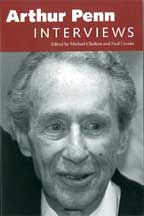 Book Reviews: DEC 2010

Hitting his creative apogee in the 1960s and 1970s, director Arthur Penn (1922-2010) crafted a handful of significant films, including The Left Handed Gun (1958), The Miracle Worker (1962), The Chase (1966), Bonnie and Clyde (1967), Alice’s Restaurant (1969), Little Big Man (1970), and Night Moves (1975). Nominated for an Academy Award three times, Penn directed such Hollywood icons as Anne Bancroft, Warren Beatty, Marlon Brando, Faye Dunaway, Robert Duvall, Jane Fonda, Gene Hackman, Dustin Hoffman, Paul Newman, Jack Nicholson, and Robert Redford. Born in Philadelphia, he fought in the Battle of the Bulge, attended North Carolina’s experimental Black Mountain College, worked in early television, enjoyed a highly successful Broadway career, mentored John F. Kennedy in his televised debates with Richard Nixon, served as president of the Actors Studio, and was brother to noted photographer Irving Penn. What a life! In Arthur Penn: Interviews (Jackson: University Press of Mississippi, 2008; pp. xxviii + 219; paperback, $22.00), editors Michael Chaiken and Paul Cronin have assembled a superb collection of conversations, twenty-four in number, dating from 1963 to 2007. Their book also contains an Introduction to the director and his work, a Chronology, and a Filmography. “The intent of this collection,” they assert, “is to help nourish scholarship and interest in Arthur Penn’s work. We hope this volume is both revelatory and readable in its attempt to offer something new to his admirers and to those coming to the films for the first time.” Chaiken and Cronin have succeeded; Penn devotees and neophytes alike will relish this impressive, essential publication. The interviews reveal Penn to be erudite, insightful, opinionated, candid, and politically engaged. Consider, for instance, his response to the accusation that Bonnie and Clyde (1967) incited violent behavior: “It’s easy to blame cinema for the violence around us. I’ve seen lots of horror films but they’ve never made me go out and kill someone. Why not blame literature, our parents, even ourselves? People condemn films but perhaps it’s cinema that condemns society.” Questioned how American moviegoers reacted to his revisionist Western, Little Big Man (1970), Penn observed: “The conservatives didn’t know if I was being serious or not. For some, the portrayal of General Custer was an absolute betrayal. Others found it inversely racist, saying I’m the first Cheyenne film director. But all I’m asking is that we acknowledge the terrible crimes we committed. American cinema has continually parodied and ridiculed Native Americans, depicting them as savage beasts, in order to justify the fact that we wiped them out. This might ease some people’s conscience but I’m having none of it. I’m totally against this form of hypocrisy.” Asked how he felt about The Missouri Breaks (1976), which received a drubbing from the critics, Penn admitted: “I was never passionate about the film. I basically did it for three reasons: I wanted to work with Brando and Nicholson, I needed the money, and I wanted to shoot something in the summer of 1975. I also wanted to film in Montana where I’d made Little Big Man because I really like it there, but I couldn’t tell you what significance the film has for me…I don’t really know what I was doing making the film. It was like passionless sex.” And here is Penn on the studio system, which he detested: “I was completely bewildered at what I encountered while working for that studio [Warner Bros.], and I think that what bewildered me about the film world back then continues to bewilder me. I was startled to discover that the people in Hollywood referred to motion pictures as an ‘industry’ and to the films as ‘product.’ That this was how they looked upon what we were turning out was a staggering insight to me.” Arthur Penn: Interviews is part of the University Press of Mississippi’s “Conversations with Filmmakers Series,” which also includes volumes on Woody Allen, Hal Ashby, Francis Ford Coppola, Brian De Palma, Alfred Hitchcock, Roman Polanski, Martin Scorsese, and George Stevens. Film students and cinephiles should acquaint themselves with this outstanding collection from UPM.
 |
 "Arthur Penn: Interviews" (Conversations With Filmmakers Series)
"Arthur Penn: Interviews" (Conversations With Filmmakers Series)